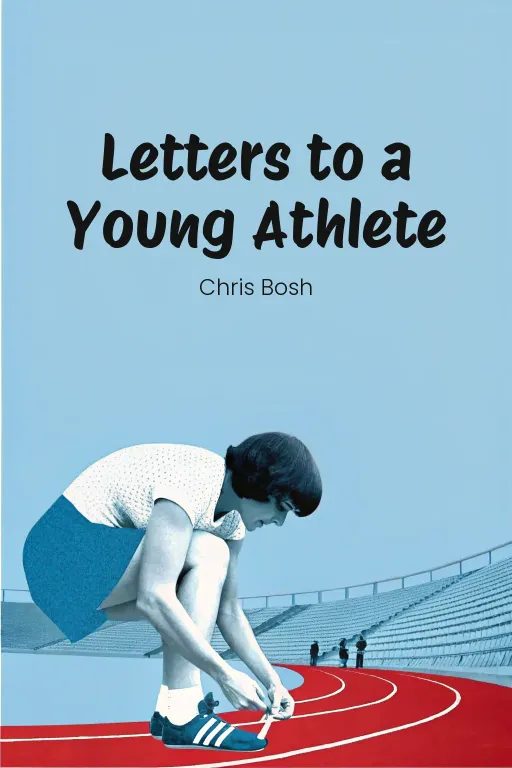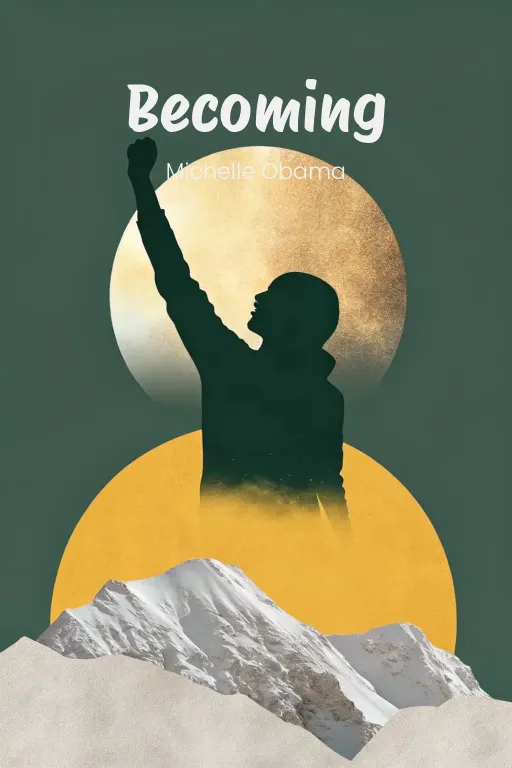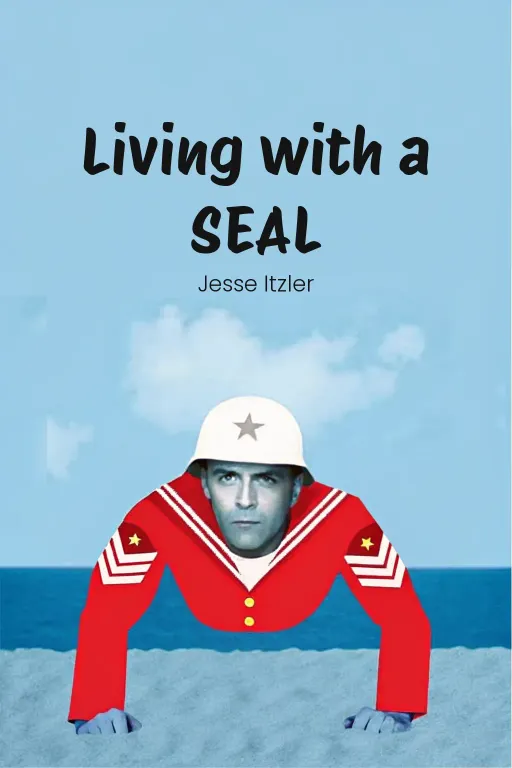
Find Your Edge: Purpose, Prep, Team!
Podcast by Beta You with Alex and Michelle
An NBA Champion's Hard-Earned Wisdom on the Road to Self-Mastery
Find Your Edge: Purpose, Prep, Team!
Part 1
Alex: Hey everyone, welcome to the show! Today we're diving into something really impactful. Whether you're an athlete, a coach, or just someone looking for that extra push in life, I think you'll get a lot out of this. Michelle: Absolutely, Alex. We're tackling "Letters to a Young Athlete" by Chris Bosh, the NBA superstar. Now, don't let the title fool you... This isn't just for aspiring basketball players; it's really a guide for anyone grappling with ambition, overcoming obstacles, and, well, actually achieving something. Alex: Exactly! Bosh shares his own journey, from a kid with huge dreams to the Basketball Hall of Fame. But the real takeaway is the message: yes, winning is great, but it's also about dedication, putting in the effort, and finding joy in the process itself. Michelle: Right, and he's super honest about the tough parts. All the sacrifices, the inevitable failures, and what it “really” takes to persevere when things are bleak. He talks about bouncing back from setbacks and even dealing with the end of his career. Alex: So, we're breaking down the book into three key themes: purpose, preparation, and teamwork. Purpose is your 'why' – why do you get up in the morning, why push through challenges, right? Without that, even success can feel empty. Michelle: Then there's preparation: the nitty-gritty, both physically and mentally. Because let’s face it, raw talent alone can only get you so far without discipline and the right mindset. Alex: And finally, teamwork. Bosh reminds us that no matter how gifted you are as an individual, it’s collaboration and collective effort that turn potential into something truly great. Michelle: Think of it like building a pyramid, you know? Purpose is the foundation, preparation forms the core, and teamwork is the capstone that holds everything together. This isn't just sports talk; it's life advice, amplified. Stick with us. Alex: Okay, let's jump in!
Finding Purpose and Motivation
Part 2
Alex: Okay, Michelle, let’s dive into the base of this pyramid: purpose and motivation. Chris Bosh really emphasizes finding your “why.” It’s central to everything he talks about, and honestly, it makes perfect sense. If you don’t know why you’re doing something—if you're not truly connected to it—how can you keep pushing when things get tough, you know? Michelle: True, but here’s where it gets tricky, Alex. Not everyone has that super clear “why” right away. Bosh had that moment in high school when his coach pushed him, but how many athletes—or people in general, really—actually sit down and figure that out? Alex: Exactly! That's his point, though—you need those moments of reflection to untangle your motivations. He’s clear that it takes work. It’s not just about liking basketball; it’s about digging into why you like it. Is it the teamwork? The thrill of competition? An escape? For him, it became about basketball as a way to learn about himself. Michelle: But don’t you think most young athletes—and people in general—are more focused on, like, external rewards? Trophies, scholarships, money, Instagram followers? It feels like the world basically demands that you chase those external wins. Alex: Absolutely, and Bosh is upfront about that. He argues how unreliable external validation is. Fame, success—they’re shaky foundations for motivation. Once the spotlight fades, or you hit a wall, if you're only chasing applause, you're left with nothing to hold on to. Michelle: That’s a strong point. I mean, he even talks about athletes who lose their way after retirement. They don’t know who they are without the sport or the recognition. It’s like they built their identity on sand. Alex: Right. That’s why he pushes young athletes to build their motivations on something deeper. He even connects it to companies like Disney or Apple. They thrive not because they just want to make another gadget or movie, but because they’re focused on their core purpose. Michelle: So the message to athletes is: be less like a highlight reel and more like Steve Jobs? Alex: In a way, yes! Think about the New Orleans Saints after Hurricane Katrina. They weren’t just playing to win—they were playing to uplift an entire community. Their “why" was about something far greater than just football. Michelle: That’s a powerful example, you're right. Purpose connected to something bigger than yourself—that’s the kind of motivation you can’t measure in stats. But… not every athlete gets to play for a city recovering from a crisis. Alex: True enough, but the core idea is universal. Building team spirit, personal growth, or even just the sheer fun you get from competing—finding a core motivation builds resilience. Michelle: Resilience, huh? Bosh talks about how adversity becomes easier when it's tied to a purpose. That resonated with me a lot—because if you're just grinding for rewards, who cares when you mess up? But if you're driven by something bigger, setbacks don’t define you. Alex: Exactly! And that’s why he warns young athletes against living for other people’s goals. How many kids do you see out there working hard because it’s what their parents want, or what their friends expect? Michelle: Way too many. I appreciate Bosh's honesty about his own journey here. Even as an All-American, he faced external pressures that blurred his motivations. It wasn’t until he stripped that all away—the trophies, titles, expectations—and reconnected with the feeling of basketball that he found clarity. Alex: Right! I love how he describes those sensory anchors: the squeak of shoes, the feel of the ball, the camaraderie. By focusing on those pure moments of joy, he fell back in love with the game. Michelle: It’s a great reminder that we all need to take a step back. Stop chasing everyone else’s approval and figure out what makes you tick. I wonder, Alex, how do we help athletes—or anyone, really—figure out their "why"? Alex: Bosh offers practical steps. He suggests journaling to dig deeper, to peel back the layers. Write down what genuinely excites you about your sport—or your passion—beyond any rewards. Think about moments of pride and joy. And if writing isn’t your thing, he’s a big fan of visualization. Michelle: Visualization—that’s like, your “mind’s highlight reel,” isn’t it? Picture yourself at your best, remember what got you hooked, and replay it in your head? Alex: Exactly. It’s not just about motivation—it’s about creating mental clarity. When athletes visualize those passionate moments, they remember the core reasons they started in the first place. It can be grounding, especially when times get tough. Michelle: I can see how that works. But the cynic in me says, “Okay, great—you find your why. What happens when training still sucks? Or you still lose?” Alex: That’s where the idea of longevity comes in. Bosh explains that purpose isn’t just for the easy days. It’s your anchor during the hard ones. When you’re connected to a meaningful “why,” the grind becomes bearable, even rewarding. It’s the difference between pain feeling pointless versus pain feeling like it’s leading somewhere. Michelle: Alright, I’ll buy that. Thinking of purpose as a survival mechanism for the tough times—hard to argue with that. Alex: And it’s more than survival—it’s also about fulfillment too. When your efforts are motivated by something authentic, success becomes much more than just checking off boxes. It becomes meaningful in a real way. Michelle: So, to recap: stop living for likes and trophies and start living for what actually fulfills you. I’ll admit, Bosh makes a pretty convincing case for this “find your why” mission. Alex: He really does. And it’s not just for athletes either—it’s a reminder for all of us to ground ourselves in purpose. Whether you're on the field, in the classroom, or at work, knowing your “why” changes everything about how you approach it.
Physical and Mental Preparation in Sports
Part 3
Alex: So, from understanding what drives us, the discussion naturally flows into how we actually prepare ourselves – mentally and physically – to achieve those goals. Bosh really emphasizes that success isn’t just about raw talent or how hard you work; it’s about building a solid base through physical conditioning and mental toughness. Michelle: That’s “really” the core of it, isn’t it? Because even if you have a crystal-clear vision of your purpose, if your body and mind aren't ready for the pressure, that "why" won’t get you very far. Let's dive into the physical side first – things like fatigue, conditioning, and endurance. Alex: Exactly. Bosh points out that fatigue, while being brutal, is also a critical training tool. He describes those endless high school drills, driven by his coach, who constantly hammered "Work on stamina". While those sessions were dreaded, they also built incredible resilience in him and his teammates. Michelle: And that resilience isn’t just about the body. Sure, pushing through those conditioning sessions builds physical strength and stamina, but there's also a mental aspect, right? The real transformation happens when you push yourself, even when your body screams at you to stop. Alex: Precisely. Bosh argues that those moments of exhaustion actually train your mind to overcome obstacles beyond just physical limits. Kobe Bryant is another great example, he famously treated fatigue as a prompt to push even harder. For him, it wasn’t about giving in, but about using that feeling as an invitation to overcome. Michelle: Okay, but let's bring it down to earth for a second. Not everyone is Kobe. When Bosh talks about embracing fatigue, is there a risk of glorifying overtraining? It's a fine line between building endurance and just burning out. Alex: That’s a great point, and I think Bosh balances that well. He’s not suggesting we blindly push through pain, but rather develop an awareness of what your body can handle. It's about finding growth within discomfort without pushing yourself to the point of harm. Someone like Candace Parker, she manages that insane schedule of college championships, Olympic gold medals, and WNBA games. It’s relentless, and that hectic grind has forged her discipline. Michelle: Candace Parker’s story is just mind-blowing. Balancing all of that while staying at peak performance? Most people would buckle under just one of those pressures. Alex: Exactly. And she also highlights the toll it can take. When she says, “You really don’t have time to stop and smell the roses,” it's a reminder that the grind isn’t always glamorous— it’s demanding and often unrewarding. But for athletes like Parker, the structure of that grind allows them to compete and thrive at the highest level. Michelle: So, for our listeners who aren’t necessarily aiming for the Olympics, what's the takeaway? How do you balance pushing your limits without, you know, completely destroying yourself? Alex: It’s about pacing yourself and making strategic time for recovery. Bosh’s approach isn’t just about the push but also learning to listen to your body and know when you need to recharge. This naturally leads us to mental preparation, which is so important to sustain motivation during both training and competition. Michelle: Mental prep – I love that part. Visualization, for example, is such a fascinating tool. Athletes run simulations in their heads, previewing games, and anticipating plays. It’s like playing mental chess with reality. They're strengthening a mental muscle right alongside their physical muscles. Alex: Absolutely. LeBron James is one of the best at this. His ability to mentally prepare for games “really” enhances his already extraordinary physical abilities. He meticulously studies strategies, visualizes different game scenarios, and anticipates every single move, much like a master strategist. This mental edge allows him to make split-second decisions that can completely change the game. Michelle: And there’s Greg Maddux. You don’t have to be the most physically imposing athlete to make visualization work for you. Maddux wasn’t throwing 100 mph fastballs, but his tactical brilliance—predicting what batters would do before they even swung—made him unstoppable. He could win games with his mind, you know? Alex: It “really” shows why mental preparation is just as important as physical fitness. Visualization sharpens instincts, minimizes hesitation, and builds confidence during those chaotic moments. And when you combine it with mindfulness practices like meditation, it helps athletes maintain focus and manage the stress and anxiety of high-stakes situations. Michelle: Mindfulness – it’s kind of a buzzword these days, but it “really” does work. It’s like teaching your brain to be calm in the middle of a storm. Alex: Exactly. And when you pair it with visualization, mindfulness gives athletes the tools they need for mental clarity. Bosh mentions how reducing distractions, through meditation or even just simple routines like turning off screens before bed, helped him stay calm before “really” important moments. Michelle: Alright, we've talked about physical conditioning and mental sharpening. What ties it all together is self-care – nutrition, recovery, and treating your body like a prized asset. Bosh highlights that with the LeBron James stat: $1.5 million a year on wellness. I mean, wow. Alex: It’s incredible, isn’t it? That investment covers everything from a personal chef to specialized trainers to recovery treatments. It’s a reminder that longevity requires more than just hard work. It’s about “really” smart, intentional care for your body and mind. Michelle: And it’s not just LeBron. Look at Kawhi Leonard, who’s known for prioritizing recovery, even if it means sitting games out. He's been criticized for it, but honestly, it’s a brilliant strategy for sustaining a long career. Alex: Absolutely. By “really” tuning into their physical limits, athletes like Kawhi show us that self-care isn't selfish—it's what makes consistent excellence possible. It’s not about just pushing through injuries; it’s about making smart choices to support long-term performance. Michelle: So, from stretching routines to mindfulness to high-level recovery techniques, the message is pretty clear: athletes don’t just prepare for one big game—they prepare for a lifetime of games. That’s the secret to longevity.
Leadership and Teamwork
Part 4
Alex: So, after preparation, the next thing to consider is how all these skills translate into leadership and teamwork. They really go hand in hand, don't you think? Especially in something like sports – you can't have sustained success without both. Michelle: Exactly. What Chris Bosh touches on, that I find interesting, is how these things work. Leadership isn't just about making big speeches or holding the trophy, is it? Sometimes it's the daily grind, just showing up and inspiring others. But leadership, it’s kind of a buzzword. Alex, where do we even begin to unpack something like that? Alex: Right, well, Bosh starts by seeing leadership as a reflection of your character. It's about leading by example, being consistent, and building trust. It's not just about bossing people around or trying to steal the spotlight. Think of Juwan Howard. He wasn't a star player during his time in Miami, but his commitment off the court really motivated the younger guys. His discipline was contagious, and what better way to lead than by your actions, not just your words? Michelle: Yeah, this idea of quiet leadership is really appealing. You don’t have to be all bluster and noise. You can be like Juwan Howard, bringing this silent focus that makes everyone want to follow suit. But doesn’t this put extra pressure on those of us who aren't, say, naturally disciplined to always “lead by example”? Alex: It can, and that’s why adaptability is key. Bosh also talks about Pat Riley's leadership style with the Heat. Riley was tough, but he also knew when to back off and encourage. It’s all about balancing accountability with showing you're invested in their growth. That balance creates trust. If players know you believe in them, they're much more likely to buy into the team culture. Michelle: Okay, but hold on. Riley's at a level where he can demand sacrifice because he's already built a legacy, right? Not everyone has that kind of pull. What about a younger athlete, or even a manager in any field, trying to lead without that clout? Alex: That’s a fair point. But credibility doesn't always mean accolades and titles. For Bosh, leadership was also about being vulnerable. After a bad performance in the 2013 Eastern Conference Finals, he owned it publicly. Imagine saying "That was on me." That kind of openness can build trust faster than yelling or ordering people around ever could. Michelle: Vulnerability as strength? That's interesting. It's counterintuitive, but I get it. Admitting your mistakes humanizes you, makes you relatable to others. But I have to ask, when was the last time you saw someone like a Michael Jordan embrace humility? Do you picture MJ ever saying, "Yeah, I messed up"? Alex: Probably not! But Bosh isn’t saying there’s only one way to lead. Not everyone needs to be Michael Jordan – or even LeBron James, who used emotional intelligence to address the team after tough losses. Some leaders are showy and commanding, others are consistent and humble. It’s all about the situation and your own personality. Michelle: So, leadership is fluid, something that shifts based on the team dynamics, and the moment. Got it. Now, let's talk about the other side: managing egos. You can be the best leader, but if your team’s drowning in ego, you’re not going anywhere. Alex: That's where humility becomes so important. Bosh's own move to Miami is a perfect example. He went from being the star player in Toronto to playing alongside LeBron and Dwyane Wade. Talk about a wake-up call for your ego! And it wasn’t easy for him, either. He admits it took time to blend his own ambitions with what was best for the team. Michelle: I mean, imagine going from the main course to the side dish in one season! And that adjustment wasn't just personal growth, but it must have spread throughout the locker room. But let's be real. It's easier said than done to sacrifice stats, especially when contracts, fan expectations, Hall of Fame dreams are involved. Do you think most players can really make that kind of shift? Alex: It’s absolutely not easy. Bosh even mentions the "disease of me" – which is what Riley called it when personal desires poison the team. To combat that, everyone on that 2012-2013 Miami team bought into a shared vision. They built mutual respect and commitment that was bigger than individual goals. That's why their back-to-back championships prove that teamwork beats ego every single time. Michelle: Okay, but then let's get practical. How does a team actually do that? How do you turn "me" into a "we"? Alex: Communication is essential. I'm not just talking about shouting plays during the game. Bosh stresses creating open communication, both on and off the court. Like LeBron, after a loss, bringing the team together and framing the setback as an opportunity. That kind of emotional IQ keeps the team unified, even when things get tough. Michelle: Emotional intelligence...it's a bit of a buzzword these days, but it's also crucial. And it makes me circle back to what you were saying – that leadership may not need some kind of star status, but you have to have emotional awareness. If you can’t read the room, how can you lead anyone? Alex: Absolutely, and beyond emotions, trust is so important. Strong communication builds reliability between teammates, and that becomes the bedrock for everything. Think about that moment in Game 6 of the 2013 Finals when Bosh grabbed the offensive rebound that led to Ray Allen's game-tying three-pointer. No hesitation, just trust. Plays like that don’t happen without building chemistry over time. Michelle: Ah, that rebound. One of the most underrated plays, I agree. And you're right – that play shows how leadership and teamwork come together. Bosh wasn’t trying to be the star – he was just doing his part to complete the play. Alex: Exactly! That moment really captured their shared identity as a team. When personal ambition takes a backseat to the group's goals, magical moments happen. For Bosh, it became less about individual glory and more about embodying the spirit of the Miami Heat. Michelle: And that's how you start creating a legacy. Leadership and teamwork aren't just about the game, but also the culture you leave behind. Whether it's mentoring younger players or building connections that last beyond the wins, that’s impact that continues. Alex: Couldn’t agree more. Bosh’s wisdom reminds us that leadership is influence, teamwork is execution, and when you combine them, that’s where legacy begins.
Conclusion
Part 5
Alex: Okay, so we've really dug in today, right? Finding your purpose, nailing the preparation, and growing as a leader and teammate. Chris Bosh's message in Letters to a Young Athlete really hits home. It’s that success isn't just about pure talent or how many trophies you've got. It’s about staying true to yourself, putting in the hard work, and, you know, building something bigger than yourself. Michelle: Exactly. And what I found really interesting is how Bosh ties all these things back to life in general. Because whether you're trying to figure out your "why," fine-tuning your mental and physical game, or swallowing your pride to build a stronger team, these are lessons you can use anywhere, not just on the court. Alex: Absolutely. Purpose gives you that direction, that north star, right? Preparation lays the groundwork, and teamwork... well, that makes sure you're never going it alone. It’s about pushing for excellence, but also staying true to your values and the people around you. Michelle: So, for me, the big takeaway is to look beyond the stats and championships. Real success isn’t just a highlight reel, it's about the kind of lasting impact you have, both on your own path and on the lives of others. Alex: That's beautifully said, Michelle. And for everyone listening, here's your little assignment: Take a moment, really think about your own "why." What gets you fired up? What makes those tough days feel worthwhile? Getting clear on your purpose, it changes everything, not just in sports, but in literally every aspect of your life. Michelle: And remember, it's not all on you, alright? Build that team, lean on the people around you, and remember what Bosh said: the name on the front of the jersey will always be bigger than the name on the back. Alex: I couldn't agree more. Thanks for joining us today, and here's to crafting purpose, resilience, and strong connections in whatever game you find yourself playing!









